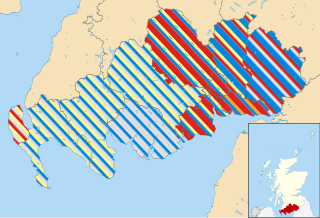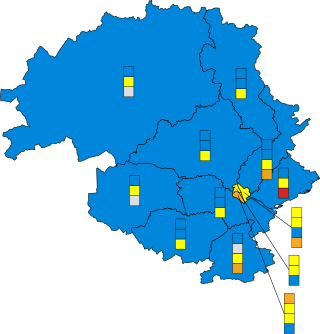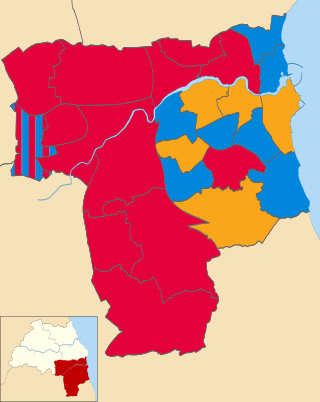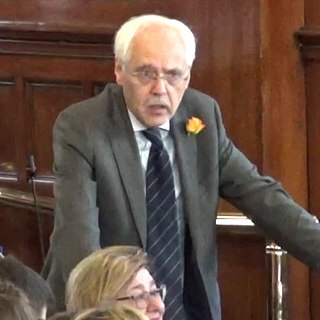Related Research Articles

Lewisham London Borough Council is the local authority for the London Borough of Lewisham,in London,United Kingdom. Elections are held every four years using a plurality bloc vote electoral system for the councillors and the supplementary vote electoral system for the elected mayor.
Elections to East Dunbartonshire Council were held on 3 May 2007,the same day as the other Scottish local government elections and the Scottish Parliament general election. This election was the first to use eight new multi-member wards created as a result of the Local Governance (Scotland) Act 2004. Each ward returned three councillors elected under the single transferable vote form of proportional representation,replacing the previous 24 single-member wards,which had used the plurality system of election.

Elections for Southwark Council were held on 6 May 2010. The 2010 General Election and other local elections took place on the same day.

Elections to City of York Council were held on Thursday 5 May 2011. The whole council was up for election. The vote took place alongside the 2011 United Kingdom Alternative Vote referendum.

Elections to Aberdeenshire Council were held on 3 May 2012,on the same day as the other Scottish local government elections. The election used the 19 wards created as a result of the Local Governance (Scotland) Act 2004,with each ward electing three or four Councillors using the single transferable vote system form of proportional representation,with 68 Councillors being elected.

The 2012 Aberdeen City Council election took place on 3 May 2012 to elect members of Aberdeen City Council. The election used the 13 wards created as a result of the Local Governance (Scotland) Act 2004,with each ward electing three or four Councillors using the single transferable vote system a form of proportional representation,with 43 Councillors elected.

2012 Elections to East Lothian Council were held on 3 May 2012,on the same day as the other Scottish local government elections. The election used the 7 wards created as a result of the Local Governance (Scotland) Act 2004,with each ward electing three or four councillors using the single transferable vote system form of proportional representation,with 23 councillors elected.

The 2012 Dumfries and Galloway Council election took place on 3 May 2012 to elect members of Dumfries and Galloway Council. The election used the thirteen wards created as a result of the Local Governance (Scotland) Act 2004,with each ward electing three or four councillors using the single transferable vote system form of proportional representation,with 47 councillors being elected.
Elections to East Dunbartonshire Council were held on 3 May 2012,the same day as the 31 other local authorities in Scotland. The election used the eight wards created under the Local Governance (Scotland) Act 2004,with 24 Councillors being elected. Each ward elected 3 members,using the STV electoral system.

The 2015 City of York Council election took place on 7 May 2015 to elect members of City of York Council in England. The whole council was up for election. Turnout was substantially up across the city due to the election being held on the same day as the general election and other local elections in England.

The Glasgow City Council election of 2017 was held on 4 May 2017,the same day as the 31 other Scottish local government elections. The election was the first to use 23 new wards,created as a result of the Local Government Boundary Commission for Scotland's 5th Review. Each ward elected three or four councillors using the single transferable vote system,a form of proportional representation used since the 2007 election and according to the Local Governance (Scotland) Act 2004.

Elections to Perth and Kinross Council were held on 4 May 2017,the same day as the other Scottish local government elections. The election covered the twelve wards created as a result of the Local Governance (Scotland) Act 2004,with each ward electing three or four councillors using the single transferable vote system form of proportional representation,with 40 Councillors being elected,a reduction of 1 member compared to 2012.

The 2017 Aberdeen City Council election took place on 4 May 2017 to elect members of Aberdeen City Council. The election used the 13 wards created as a result of the Local Governance (Scotland) Act 2004,with each ward electing three or four Councillors using the single transferable vote system a form of proportional representation,with a total of 45 Councillors elected,an increase in two members from 2012.
The 2017 Highland Council election was held on 4 May 2017 to elect members of the Highland Council. The election used the 21 wards created under the Local Governance (Scotland) Act 2004;each ward elected three or four councillors using the single transferable vote system. A total of 74 councillors were elected,six less than in 2012.

Elections to City of York Council were held on 2 May 2019,as part of the United Kingdom local elections. The election resulted in substantial gains for the Liberal Democrats,who became the largest party,although no party surpassed the 24-seat majority threshold. The Conservatives suffered badly in this election,and lost 12 of the 14 seats they had won at the previous election. The Green Party held all their four seats,and surpassed the Conservatives in the popular vote. Labour gained two seats,although they failed to gain support in rural areas,where voters favoured the Liberal Democrats. On 14 May,The Liberal Democrats and the Green Party announced that they had agreed to run the council in a new 'progressive partnership' coalition,with Green Party leader Andy D'Agorne assuming the role of Deputy Leader of the Council while Liberal Democrat leader Keith Aspden succeeded Ian Gillies as Leader of the Council.

The 2021 Sunderland City Council election took place on 6 May 2021 to elect members of Sunderland City Council in England on the same day as other elections across the United Kingdom.
Elections to The Highland Council were held on 5 May 2022,the same day as the 31 other Scottish local government elections. The election used the 21 wards created under the Local Governance (Scotland) Act 2004,with 74 councillors being elected. Each ward elected either 3 or 4 members,using the STV electoral system.

Elections to South Lanarkshire Council took place on 5 May 2022 on the same day as the 31 other Scottish local government elections. As with other Scottish council elections,it was held using single transferable vote (STV) –a form of proportional representation –in which multiple candidates are elected in each ward and voters rank candidates in order of preference.

Elections to Argyll and Bute Council took place on 5 May 2022 on the same day as the 31 other Scottish local government elections. As with other Scottish council elections,it was held using single transferable vote (STV) –a form of proportional representation –in which multiple candidates are elected in each ward and voters rank candidates in order of preference.

The 2023 Liverpool City Council election took place on 4 May 2023 to elect members of Liverpool City Council. Following a Boundary Review by The Local Government Boundary Commission for England,the size of the council was reduced from 90 to 85 seats with a change from three-member seats,elected in thirds,three years out of every four,following the British Government instigated Best Value Inspection Report which led to the appointment by the government of Commissioners and the subsequent boundary review for Council Wards in Liverpool which the government initiated with the proviso that the number of councillors be reduced and the predominant number of wards be reduced to single members with all-up elections every four years. The election also marked the end of Liverpool's directly-elected mayoralty. After the election the council reverted to having a leader of the council chosen from amongst the councillors instead. Labour retained control of the council and their group leader Liam Robinson became leader of the council after the election.
References
- ↑ "Andy D'Agorne – York Green Party".
- ↑ Services, Web. "Executive council members". City of York Council.
- ↑ "VOTE 2001 | RESULTS & CONSTITUENCIES | Sheffield Central". BBC News. Retrieved 22 January 2021.
- ↑ "Lib Dem and Green parties name York candidates". York Press. Retrieved 22 January 2021.
- ↑ "Greens withdraw from York Central fight to avoid 'splitting the vote'". York Press. Retrieved 22 January 2021.
- ↑ "1999 Election Candidates | UK Office of the European Parliament". 18 May 2009. Archived from the original on 18 May 2009. Retrieved 22 January 2021.
- ↑ "York - election results May 2003". 11 October 2003. Archived from the original on 11 October 2003. Retrieved 22 January 2021.
- ↑ "Election results May 2007 - City of York Council". 14 October 2007. Archived from the original on 14 October 2007. Retrieved 22 January 2021.
- ↑ "Fishergate Ward - City of York Council". 9 May 2011. Archived from the original on 9 May 2011. Retrieved 22 January 2021.
- ↑ Services, Web. "Local election results May 2015". City of York Council. Archived from the original on 19 July 2020. Retrieved 22 January 2021.
- ↑ Services, Web. "Local election results May 2019". City of York Council. Retrieved 22 January 2021.
- ↑ "York Greens look for a three-party coalition with Labour and Lib Dems". York Press. Retrieved 25 January 2021.
- ↑ "Lib Dems and the Green Party join forces to run City of York Council". YorkMix. 14 May 2019. Retrieved 25 January 2021.
- ↑ "Labour respond to Lib-Dem/Green coalition". York Labour. Retrieved 25 January 2021.
- ↑ Services, Web. "The Groves low traffic neighbourhood trial". City of York Council. Retrieved 25 January 2021.
- ↑ Laversuch, Chloe; Gray, Charles (23 October 2020). "Changes to York traffic scheme after 'carnage' caused for drivers". YorkshireLive. Retrieved 25 January 2021.
- ↑ "York road closures: "I am finding this increasingly stressful with all the noise"". York Press. Retrieved 25 January 2021.
- 1 2 "Video: 'In time, people will get used to it' – Council leader suggests Groves traffic ban will become permanent". YorkMix. 2 September 2020. Retrieved 25 January 2021.
- ↑ haulage - BingNews, road (16 June 2020). "Groves road closures plan is to start in York". Translogistics. Retrieved 25 January 2021.
- ↑ Administrator. "Bishopthorpe Road temporary traffic measures to end". iTravel York. Retrieved 25 January 2021.
- 1 2 "Bishopthorpe Road to fully reopen after residents provided 'valuable feedback' on its closure". YorkMix. 30 July 2020. Retrieved 25 January 2021.
- ↑ "Council transport chief speaks out on ring road dualling plan after his party said it 'should be scrapped'". York Press. Retrieved 25 January 2021.